|
|
|
Sort Order |
|
|
|
Items / Page
|
|
|
|
|
|
|
| Srl | Item |
| 1 |
ID:
107444
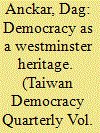

|
|
|
|
|
| Publication |
2011.
|
| Summary/Abstract |
Conventional wisdom from colonial history research has it that the states which
the British left behind them were better equipped for democratic government
than the states that had belonged to other colonial powers. Investigating the
democracy fortunes of all fifty-four territories that were freed following World
War II from British control, and applying Freedom House ratings to determine
democracy status, this study examines the belief that democratic government
has become a characteristic feature of former British possessions. Findings are
that the former colonies may be ordered roughly into three groups. Whereas
seventeen countries since 1972 have always, or almost always, been classified as
democracies, a larger portion, consisting of twenty-three countries, has always,
or almost always, been ranked as non-democracies. The remaining fourteen
countries represent an in-between category. On the whole, therefore, the idea
that democracy is a central part of the Westminster heritage overall cannot
be supported. Explanations for the division of the former colonies into three
groups have been researched in different directions, and the efforts substantiate
earlier observations in the literature on the relevance to democratization of
factors that relate to state size, modernization, and geography. Concerning the
impact of the length of colonial rule, the findings confirm an earlier suggestion
by Samuel Huntington that colonies which had a long British presence have
been particularly well equipped to develop into stable democracies.
|
|
|
|
|
|
|
|
|
|
|
|
|
|
|
|
| 2 |
ID:
107446
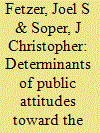

|
|
|
|
|
| Publication |
2011.
|
| Summary/Abstract |
This article investigates the current attitudes of the Taiwanese public toward
the rights of aborigines (Yuanzhumin), a neglected topic both in Taiwan and
throughout the world. The theoretical literature on ethnic politics suggests that
such attitudes might be rooted in one's level of education, ethnic group conflict
and partisanship, intergroup contact, and/or religion-like ideology (Confucian
values). Using data from the 2006 Taiwan Social Image Survey I and our 2009
privately commissioned poll on support for the rights of Taiwanese aborigines,
we test these four theories and find that higher education increases support
for aboriginal rights. The results confirm the ethno-partisanship model for
2006 but not for 2009. Conversely, the percentage of Yuanzhumin living in
a region boosted hostility toward them in 2009 but not in 2006. We likewise
discover that two Confucian values (family loyalty and social hierarchies)
have no statistically significant effect on attitudes toward Yuanzhumin. A
third key Confucian value, social harmony, appears to increase support for
aboriginal rights. Surprisingly, Confucian values seem to pose no hindrance
to the advancement of ethnic minorities' rights and may, in fact, even promote
them.
|
|
|
|
|
|
|
|
|
|
|
|
|
|
|
|
| 3 |
ID:
107445
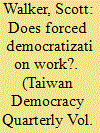

|
|
|
|
|
| Publication |
2011.
|
| Summary/Abstract |
Over the past seven decades, democratic powers, led by the United States,
have attempted to bring about democracy through external military imposition.
While research to date has generally pointed toward the conclusion that
such efforts are often not successful in effecting full-fledged democracy,
studies almost exclusively have focused on how interventions have affected
institutional measures of democracy in target countries (as opposed to
political rights or political competitiveness). In addition, such studies have
not recognized that there is more than one way to denote a democratizing
intervention. I find that, regardless of what measure of democracy one uses,
attempts to force democracy are generally not successful. However, "success"
also depends to a degree upon how one chooses to define attempts at forced
democratization. This research reinforces existing research, indicating that
democratizing interventions are rarely found to result in healthy consolidated
democracies over the long term.
|
|
|
|
|
|
|
|
|
|
|
|
|
|
|
|
| 4 |
ID:
107442
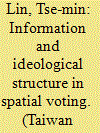

|
|
|
|
|
| Publication |
2011.
|
| Summary/Abstract |
This article aims at unifying the theory of spatial voting and the theory that is
variously called conceptualization, information, or sophistication. Following
Downs's early insights on uncertainty as well as recent developments in both
literatures, I argue that it is of critical importance that spatial voting models
explicitly incorporate information effects. For this purpose, I develop a
heteroskedastic probit model that allows for the specification of information
heterogeneity. This model is applied to the Taiwan Election and Democratization
Study's 2004 post-presidential election survey data. In 2004, Taiwan's political
landscape was dominantly defined by the Green vs. Blue ideological cleavage,
and the candidates were perceived as taking divergent positions. This article
investigates the effects of information and activism on the spatial structure and
their implications on candidates' strategies. My findings confirm the existence
of these effects on voter uncertainty in the framework of spatial analysis.
1
|
|
|
|
|
|
|
|
|
|
|
|
|
|
|
|
| 5 |
ID:
107443
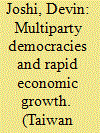

|
|
|
|
|
| Publication |
2011.
|
| Summary/Abstract |
This essay examines whether developing countries with competitive multiparty
democracies may be just as capable of sustaining rapid economic growth
as single-party states. It begins with a literature review identifying political
stability and the ability to mobilize labor and capital production inputs as key
factors behind sustained rapid growth. It then develops the hypothesis that under
certain conditions, multiparty democracies may be strong in these dimensions,
but ceteris paribus, single-party states are likely to have an advantage. I test
this hypothesis by exploring historical trends in rapid growth over the last five
decades. Statistical regression analysis confirms that most sustained highgrowth regimes have not been competitive multiparty democracies. On a more
optimistic note, however, the number of high-growth multiparty democracies
increased significantly during the period between 2000 and 2009, signaling a
possible breakthrough in the twenty-first century.
|
|
|
|
|
|
|
|
|
|
|
|
|
|
|
|
| 6 |
ID:
107448


|
|
|
|
|
| Publication |
2011.
|
| Summary/Abstract |
When a semi-presidential constitution is adopted in a young democracy, there
is much discussion about the relationship between semi-presidentialism and the
stability of the democracy. The Weimar Republic was one of the original semipresidential regimes. Although the Weimar Constitution was meant to provide
for a parliamentary system, the actual exercise of the Weimar Constitution
was consistent with semi-presidentialism. Taiwan is a young democracy that
has a semi-presidential constitution. The design of Taiwan's constitution
resembles that of the Weimar Constitution. The first version was a revision of
the Weimar Constitution and was primarily parliamentary. However, with the
1997 constitutional revisions, Taiwan's constitutional structure acquired many
semi-presidential features. This essay argues that Taiwan's constitution was
originally inspired by the Weimar model, and with revision in 1997, became
very Weimar-like. It attempts to introduce the design, revisions, and functions
of the constitution in Taiwan.
|
|
|
|
|
|
|
|
|
|
|
|
|
|
|
|
| 7 |
ID:
107447


|
|
|
|
|
| Publication |
2011.
|
| Summary/Abstract |
As the effectiveness of short-term campaigns is uncertain, politicians and
campaigners are increasingly adopting permanent campaigns. In this process,
midterm elections are a cost-effective vehicle for senior politicians to build
relationships with local candidates while promoting their own candidacies.
Previous research on celebrity endorsement and the coattail effect has primarily
focused on the results of political endorsement, while overlooking the process
of such activities. More importantly, few studies have addressed how local
politicians perceive the embedment of their own campaign into their senior
colleague's permanent campaign.
The authors of this article conducted four in-depth interviews with
local officials, the transcripts of which were analyzed using an interpretive
approach. Our finding highlights magistrates and mayors' worries about
being marginalized by the president. Furthermore, they believe that local
affairs should be dealt with locally, and that involving the president is a
sign of weakness. Theoretical and managerial implications of this research
are discussed in relationship to the literature on coattail effect, endorsement
strategy, and permanent campaigning.
|
|
|
|
|
|
|
|
|
|
|
|
|
|
|
|
|
|
|
|
|